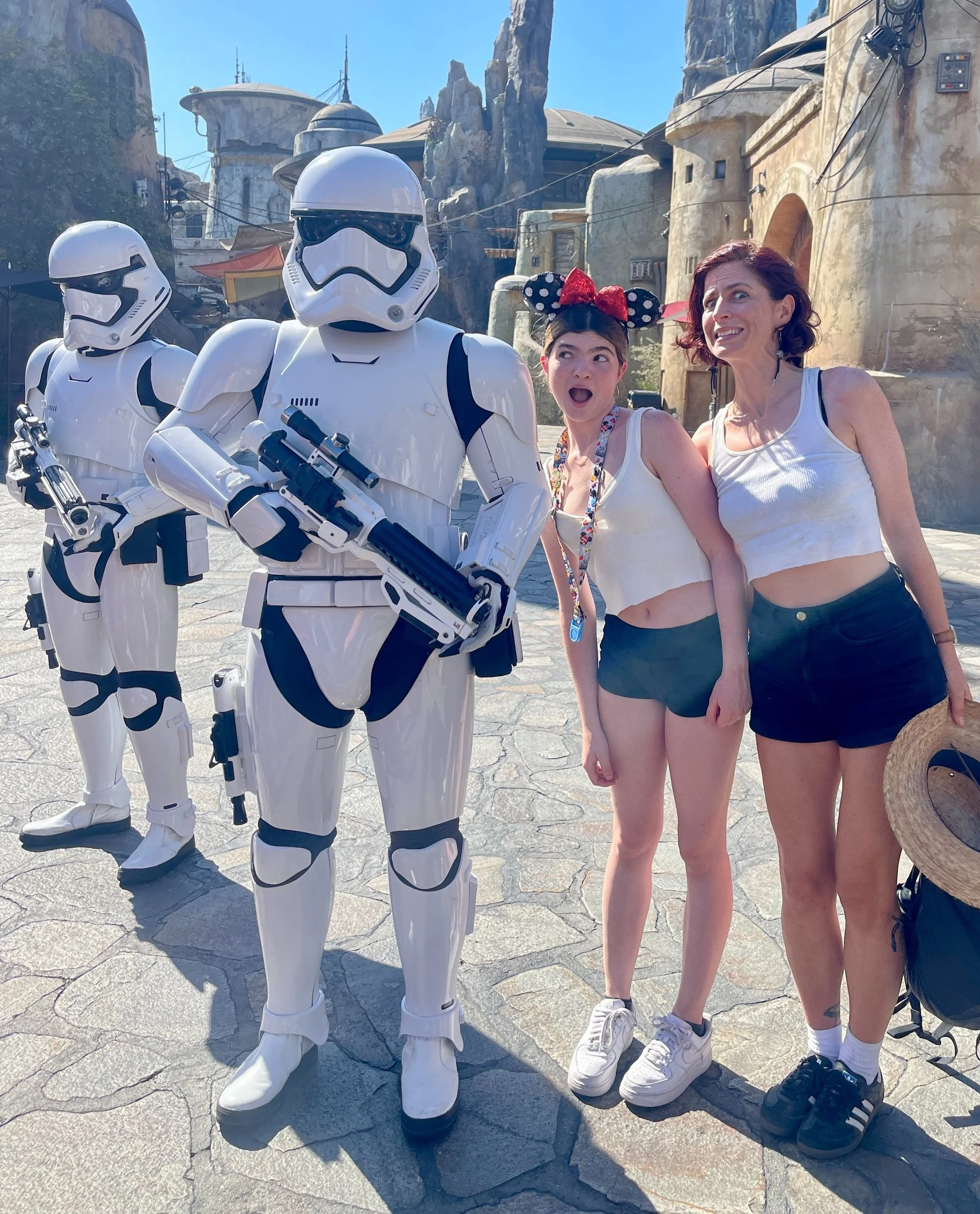Looking back to see a path forward
I have simply been luxuriating in nostalgia lately. Most recently on a trip to Disneyland with my sisters, mom, and niece. It had been 20 years since I last visited "The Happiest Place on Earth" and it was so fun to reflect on what has and has not changed, both within the park and myself. Flying over the glowing miniature London nightscape on the Peter Pan's Flight ride, I realized with great pleasure that I have been to London and walked across the iconic Tower Bridge and tiny streets depicted below. I recalled my young self's desire to see the world and felt overwhelmed with gratitude that I have in fact been able to travel beyond my childhood self's wildest dreams.
In Hook, the 1991 film interpretation of the Peter Pan story, Captain Hook struggles with a lack of purpose. He has killed the crocodile that haunted him and his arch nemesis Peter Pan has left Neverland. Instead of being happy with his achievements, he's not sure what to do with himself. Maybe this feels relatable. Burnout can feel like this, like we are adrift at sea and unsure which way to head ashore. And since Tinker Bell can't come rescue us with pixie dust, reflecting on the dreams and fantasies of our youth can help offer guidance on where to find our north star in life, a sense of purpose.
Many of us decided what we wanted to be as young adults and put our nose down to the grindstone. But in powering through years of school, internships, entry level jobs, pivots, and promotions, we lost track of where we were headed. When we finally bring our head up, we realize that we have drifted off course. Or worse yet, perhaps achieving exactly what we wanted didn't make us feel the way we wanted to feel: whole, satisfied, happy, or enough. Looking back and remembering what we liked to do as children and what interested us before we were worn down by burnout can offer some guidance about where to head next.
When someone asked what I wanted to be when I grew up as a kid I would say, "A socialite." Haha. So precocious! What child (or adult for that matter) even knows what a socialite does? I gather they just get dressed up and go to parties. But hey, to be honest, that still sounds great to me.
My childhood "career" dreams (if being a socialite counts as a career) reflects my ongoing interest in people, leisure, and fashion. Those interests continue to shape my life today. I may not be a socialite but I talk to people for a living and help them have more fun and fulfilling lives. And in my free time, I love thrifting and dressing up in wild outfits for my friends at parties. It's not the couture and galas of high society but it's still rewarding!
What did you want to be when you grew up as a child, youth, or young adult?
What about these dream jobs appealed to you?
Are there elements of your childhood dream jobs in your current line of work or in your hobbies?
What did you like to do for fun as a kid?
Were there common themes in your make believe or games?
Have any of these elements persisted in your current line of work or hobbies?
You can use these reflections to guide your work endeavors in ways that are likely to ameliorate burnout. The World Health Organization describes burnout as being characterized by "feelings of energy depletion or exhaustion; increased mental distance from one’s job, or feelings of negativism or cynicism related to one's job." Returning to what you have always felt inspired by can help energize, engage, and invigorate your work and personal life.
If your childhood dream was to become an astronaut I'm not suggesting you quit and apply for a position at NASA. (Though if that's what you want, go for it.) Rather, consider job crafting. That is, turning the job you have into the job you want. Job crafting has been shown to improve job satisfaction and enhance engagement and resilience at work and can be achieved in 3 ways:
Change the boundaries of your job. Take on more or fewer tasks. Expand or contract the boundaries of your responsibilities. An aspiring astronaut won't be experiencing zero gravity in their office but perhaps there is an opportunity to conduct scientific experiments, collect data, or review existing research. Do more of what interests you and less of what doesn't if at all possible.
Change your Relationships. Change the nature or extent of your relationships with other people. Astronauts act as part of a team. If that appeals to you and your work does not involve much collaboration, look for opportunities to do so. Conversely, perhaps the image of a man in a spacesuit floating far away from everything and everyone draws you in. If so, find more opportunities for solo projects.
Change your Thinking. Reframe the reason that you do your job. Did you want to boldly go where no man has gone before as an astronaut? Focus on the innovation happening at your workplace. Did you like the idea of helping the human race find somewhere in space to reside and persist in perpetuity? Focus on how your work helps society at large.
There are likely some interests that cannot be satisfied by job crafting. If so, do what you can to reconnect with your childhood interests in your free time. Maybe you, an aspiring astronaut, want to listen to science podcasts, take up scuba diving, or push yourself past physical limits at a marathon. Or maybe you just wanted to wear a big white suit. If so, consider bee keeping.
If you pursue your unique interests, in the words of Peter Pan, "to live will be an awfully big adventure."


